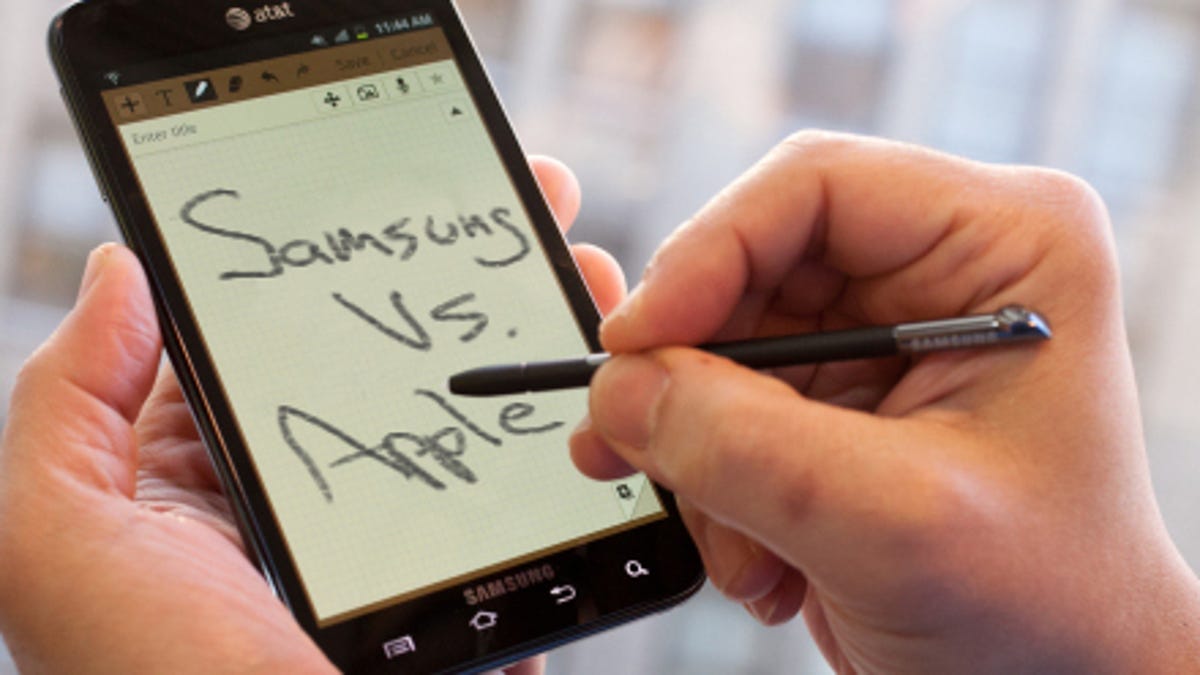Apple, Samsung rest cases ahead of final arguments Tuesday
The two companies will make their final pitches to the jury, with Apple arguing for $380 million and Samsung saying it should pay $52 million for patent infringement.

SAN JOSE, Calif. -- Apple and Samsung on Monday wrapped up the testimony in a damages retrial, setting up their positions for their last pitches to the jury.
Judge Lucy Koh allowed each side eight hours of testimony. Samsung rested its case Monday with two minutes left. Apple had 16 minutes left. They'll each have 90 minutes to make their closing arguments Tuesday morning. The case will then be handed over to a jury of six women and two men.
The two companies spent their final hours and minutes Monday grilling expert witnesses on how much money Samsung owes Apple for patent infringement. Apple says Samsung owes it $380 million for the infringement. Samsung says it should pay only $52 million.
A retrial in the United States District Court for the Northern District of California kicked off last week to determine what damages Samsung owes Apple for infringing on five of its patents. A judge in March vacated about $450 million of an original award and ordered a new jury to convene to recalculate the damages. Samsung is still on the hook for about $600 million, no matter what happens in the retrial.For most, the damages retrial was a case of Groundhog Day. No new revelations emerged during the testimony, and most witnesses also took the stand during the last trial more than a year ago. Apple's witnesses argued Samsung's copycat devices hurt the company, while Samsung argued that people seek out its devices more for their differences than similarities to Apple gadgets.
During closing arguments Tuesday, Apple will detail why it deserves nearly $400 million. A big part of the discrepancy between what Apple wants and what Samsung thinks it should pay comes from differing views on how much Apple lost in profits and how much it should be due for royalties. The two sides also disagree on how much money Samsung made from its copycat products.
Samsung will argue the company's profit totaled much less than Apple says because of expenses such as advertising. Apple's expert did not include those operating costs in her tally.
Apple says it deserves such a high amount because users would have bought more of its gadgets if Samsung's devices weren't on the market. It acknowledged that it often has supply shortages but took pains to show it could meet slightly higher demand. And at the time Apple created the iPhone, such a product was a huge risk, it says.
The companies' experts also disagree on how much Apple deserves in reasonable royalties. Samsung, for its part, argues that Apple doesn't deserve any royalties because its patents have limitations. Its expert, Michael Wagner, said Friday that there's no evidence anyone buys Samsung's gadgetsfor Apple's patented touch-screen features.Not at issue in this case is whether Samsung infringed Apple's patents. The judge will instruct the jury that a previous jury already decided Samsung infringed, and that they shouldn't revisit that issue. The sole consideration in the retrial is money -- just how much Samsung owes Apple for infringing its patents.
Apple arrived at the $380 million amount based on lost profits of about $114 million, Samsung's profits of about $231 million, and reasonable royalties of approximately $35 million. Apple estimates it would have sold 360,000 devices if Samsung hadn't released infringing rivals.
Samsung, meanwhile, said Apple shouldn't receive any money for lost profits, $52.7 million for Samsung's profits, and royalties of only $28,452 because the patents have limitations.
Apple originally filed suit against Samsung in April 2011, accusing the Korean company of copying the look and feel of its products. Samsung countersued two months later over patent infringement and said it was at work on touch-screen phones with giant rectangular screens and rounded corners well before Apple showed up. The initial trial, which stretched more than three weeks in August 2012, wrapped both of those cases in one, somehow squeezing together the patent infringement issues, alongside antitrust claims, and even trade dress issues.
Apple v. Samsung redux: What you need to know (FAQ)
In August of last year, a nine-person jury sided with Apple on a majority of its patent infringement claims against Samsung. At that time, the jury awarded Apple $1.05 billion in damages, much less than the $2.75 billion sought by the Cupertino, Calif., electronics giant. Samsung, which asked for $421 million in its countersuit, didn't get anything.
However, Koh in March ordered a new trial to recalculate some of the damages in the case, striking $450.5 million off the original judgment against Samsung. What that means is Samsung is still on the hook for about $600 million in damages, but a new jury has to decide how much else it owes.
The products in question include the Galaxy Prevail, Gem, Indulge, Infuse 4G, Galaxy SII AT&T, Captivate, Continuum, Droid Charge, Epic 4G, Exhibit 4G, Galaxy Tab, Nexus S 4G, Replenish, and Transform. The Prevail in particular racked up $57.9 million of the damages tally, which Koh said was a failure on the jury's part, since the device was found to infringe only on utility patents, and not on design patents.
Phil Schiller, Apple's head of marketing, argued last week that Samsung's copycat devices made it "much harder" for Apple to differentiate and sell its devices. He also noted that the reason Samsung gained so much market share in smartphones was because it copied Apple.
"At the end of the day, there's a cumulative effect of doing all of this that's incredibly damaging [to Apple]," Schiller said Friday.

